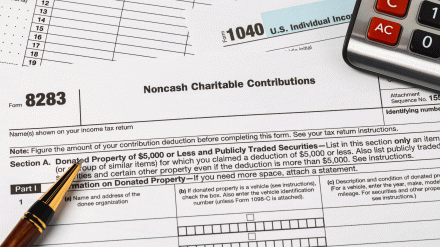Hewitt v. Commissioner, 109 T.C. 12 (1997)
Understanding IRS Form 8283
IRS Form 8283 plays a crucial role for donors who claim charitable contribution deductions exceeding $5,000 for noncash property. The form ensures accurate valuation and prevents inflated deductions. Here’s what donors and churches need to know to comply with the regulations.
What Donors Must Do
- Obtain a Qualified Appraisal: Donors must secure an appraisal from a qualified appraiser no earlier than 60 days before the donation. The appraisal must include detailed information, such as the description of the property, appraised value, and appraiser qualifications.
- Complete IRS Form 8283: Donors must include a summary of the appraisal (Section B) with their tax return. Publicly traded stock is exempt from these requirements, but nonpublicly traded stock valued over $10,000 is not.
- Maintain Records: Donors should retain detailed documentation, including the church’s name, the property’s fair market value, and a description of the property.
Why Compliance Matters
Failure to comply with the substantiation requirements can lead to denied deductions. In the case of Hewitt v. Commissioner, the Tax Court disallowed deductions due to a lack of qualified appraisal and Form 8283 submission, despite the donations’ fair market value.
Lessons for Church Treasurers
Churches should assist donors to ensure compliance with IRS regulations. Here are best practices for treasurers:
- Educate Donors: Provide copies of Form 8283 to donors making noncash contributions.
- Verify Appraisals: Follow up with donors by year-end to confirm they’ve obtained a qualified appraisal for donations exceeding $5,000.
- Keep Records: Document communications and retain copies of donor-related forms for your records.
A Limited Exception
The Tax Court allows deductions in cases of “substantial compliance,” as seen in Bond v. Commissioner. However, donors should aim for strict compliance to avoid risking their deductions.
Conclusion
IRS Form 8283 ensures accountability and accurate valuation of noncash contributions. By understanding and following these requirements, donors and churches can prevent denied deductions and maintain compliance.
FAQs on IRS Form 8283
What is IRS Form 8283? It’s a form used to report noncash charitable contributions exceeding $500, with additional requirements for amounts over $5,000. Who needs a qualified appraisal? Donors claiming deductions for noncash contributions valued above $5,000 must obtain a qualified appraisal. Are publicly traded stocks subject to these rules? No, publicly traded stocks are exempt from the appraisal and Form 8283 requirements. How can churches help donors comply? Churches can provide Form 8283, educate donors on the requirements, and remind them to obtain appraisals if necessary.
This article first appeared in Church Treasurer Alert, June 2002.





